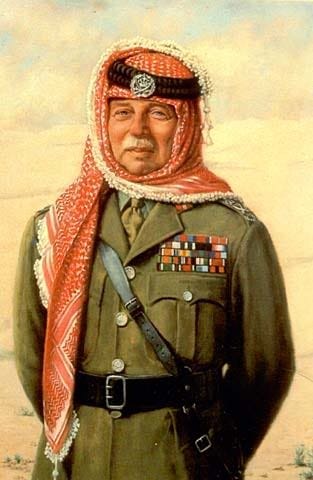The book
Lieutenant-General John Bagot Glubb, born in 1897, fought in the First World War, but it was in the sands of the desert that he made his name.
Joining the Arab Legion, a police force raised in the British protectorate of Transjordan in 1930, Glubb (know by his men as ‘Glubb Pasha’), rose through the ranks to become its commander in 1939. His transformative leadership made the Legion one of the most formidable military forces in the Arab world.
The book, published in 1948 begins with an account of the victories and empire building of Muslim armies in the 8th century, followed by the author's own tale of adventure: a journey from Iraq to Trans-Jordan by camel, a gruelling 500 miles across the Syrian desert in 1924.
But it's the Legion's activities during the Second World War that takes up the heart of the book. Employed in reconnaissance, raiding and harrying the enemy's communications. Their exploits were so impressive that at the request of the British Army, the Legion was increased in strength to three Regiments to form a mechanised Brigade, a far cry from its humble beginnings of just 100 men and camels.
The Arab Legion remained under Glubb's command even after Jordan declared its independence from Britain, until the year of the Suez Crisis, 1956, when King Hussein relieved him of his command.
And yet, in a final testament to the measure of the man, it was King Hussein himself who gave the eulogy at the service of thanksgiving for Glubb's life, held in the Westminster Abbey in 1986.
From the book
The majority of Englishmen who land in the Middle East believe the Arabs to be a backward race not yet civilized, and are unaware of the fact that the Arab Empire of the eighth century was relatively more powerful than the British Empire today, and that Arab domination lasted longer than the time during which the British Empire has been in existence. The Arabs are as conscious of their Imperial past as are the Romans or the Greeks, and people who imagine them to be a race as yet uncivilized cannot form an accurate picture of the Arab mentality. (p.20)
We seem at times to think too much of toughness, and to mistake loudness and bad manners for courage. Amongst the Bedouins, who lived in a world of violence, bloodshed and war, gentleness was not mistaken for cowardice. (p.203)
The maps
The map illustrator
The map illustrator was one Farid Azar of Amman, Trans Jordan. I’ve found nothing about him on the web.
A review
From The Economist (1948)
Glubb likes the Arabs, because liking people is in the long run is the only way to get them to do what you want. He lived among the Bedouin and recruited his police force from them one by one. The story of his achievement is well and simply told, with enthusiasm for his Arabs but without gush.
Miscellanea
You can find a copy of the book at the internet archive.









Interesting information. Another piece of history unknown to many people.
I really enjoyed reading this. I wonder if the Arab Legion was the precursor to the current Royal Bedouin Police (Desert Police Force)..?